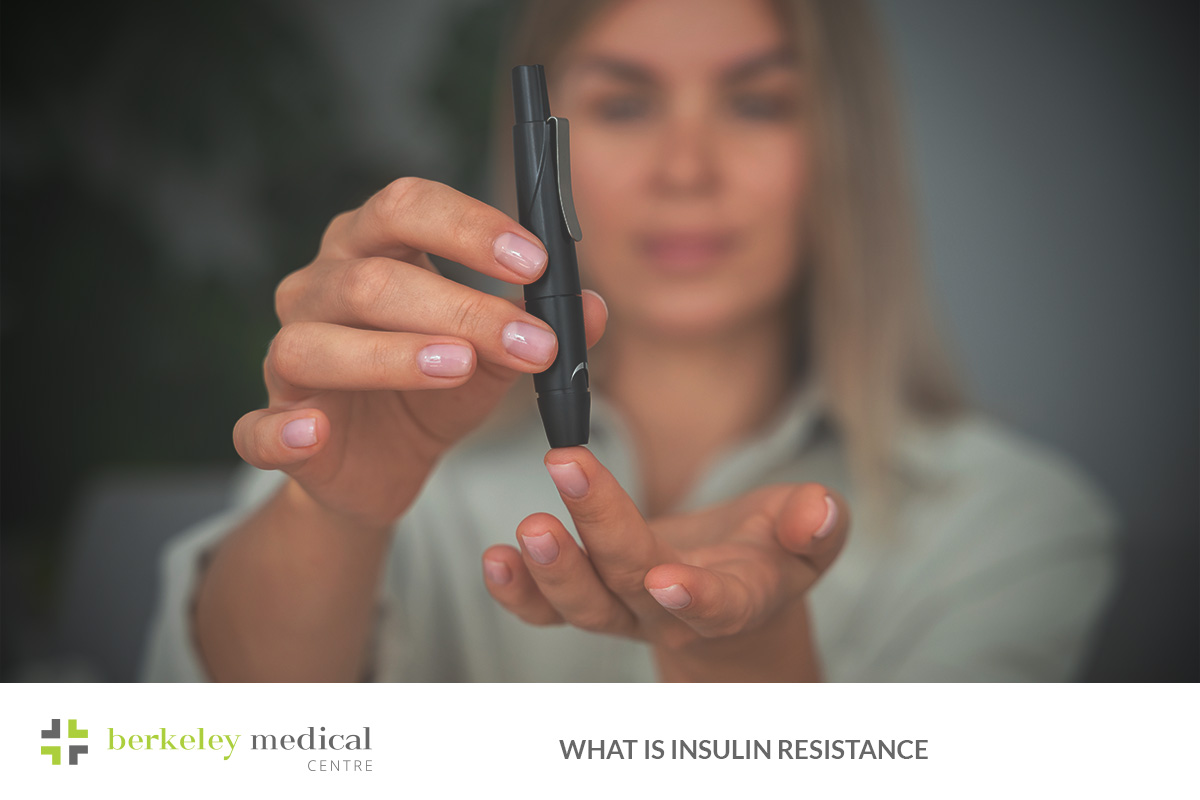Insulin resistance is a common but often misunderstood health condition that affects how your body uses glucose (sugar) for energy. It plays a major role in the development of pre-diabetes, type 2 diabetes, obesity and heart disease but with early action, you can manage or even reverse it.
In this article, we will explain what it is, its early warning signs, risk factors and the lifestyle changes that can make a big difference.
What you will Learn About Insulin Resistance
- What insulin resistance means
- Early symptoms of insulin resistance
- Causes and risk factors
- Complications if left untreated
- Ways to reverse insulin resistance naturally
- When to see your GP
What Is Insulin Resistance?
Insulin resistance happens when the body’s cells particularly in the muscles, liver and fat stop responding effectively to insulin. Insulin is the hormone responsible for helping glucose move from your bloodstream into your cells, where it is used as energy.
When cells do not respond properly, glucose builds up in the blood. In response, the pancreas releases more insulin to compensate. This overproduction of insulin is known as hyperinsulinemia.
Over time, this process becomes less effective. Eventually, blood sugar levels rise and increase the risk of developing pre-diabetes and type 2 diabetes.
What Causes Insulin Resistance?
Several lifestyle, medical and genetic factors can cause or worsen :
Excess Body Fat
Carrying excess weight, particularly around your abdomen, is one of the strongest contributors. Visceral fat (fat around the organs) affects how your body uses insulin.
Poor Diet
A diet high in added sugars, refined carbs and unhealthy fats can disrupt insulin sensitivity. Regular consumption of sugary drinks, fast food, white bread and highly processed snacks increases your risk.
Lack of Physical Activity
Being inactive reduces your body’s ability to use insulin efficiently. Regular movement helps muscles absorb glucose and improves insulin sensitivity.
Hormonal Imbalances
Conditions such as PCOS, Cushing’s syndrome, hypothyroidism and acromegaly are linked.
Certain Medications
Some blood pressure medications, corticosteroids and HIV treatments can interfere with insulin function.
Genetic Factors
A family history of type 2 diabetes or insulin resistance can raise your risk. Rare genetic syndromes like lipodystrophy or Werner syndrome also play a role.
Early Signs and Symptoms of Insulin Resistance
Many people with insulin resistance show no symptoms which is why it is often called a silent condition. However, as the condition progresses, you may notice:
- Constant fatigue, especially after meals
- Increased hunger or sugar cravings
- Frequent urination
- Excessive thirst
- Difficulty losing weight
- Blurred vision
- Darkened skin patches (acanthosis nigricans), especially on the neck or armpits
- Skin tags
If left untreated, insulin resistance can lead to pre-diabetes and type 2 diabetes. For this reason, early detection is critical.
Who Is Most at Risk?
You are more likely to develop insulin resistance if you:
- Are overweight or have obesity
- Carry excess belly fat
- Are over the age of 45
- Have a family history of type 2 diabetes or PCOS
- Live a sedentary lifestyle
- Have high blood pressure or abnormal cholesterol
- Had gestational diabetes during pregnancy
- Smoke cigarettes
- Are of Aboriginal, Torres Strait Islander, South Asian, or Middle Eastern descent
How Is Insulin Resistance Diagnosed?
Doctors typically assess your risk through a combination of:
- Family and medical history
- Physical examination
- Blood tests
Common tests include:
- Fasting blood glucose test
- HbA1c test (3-month average of blood sugar levels)
- Lipid panel (to assess cholesterol and triglyceride levels)
While there is no single test for insulin resistance, these results help evaluate your metabolic health.
Can You Reverse Insulin Resistance?
Yes, in many cases, you can reverse insulin resistance through lifestyle changes especially if you catch it early.
Here’s how:
Adopt a Low-GI Diet
Eating low-glycaemic index (GI) foods helps keep blood sugar levels stable and reduces the demand for insulin.
Good food choices include:
- Whole grains (e.g., oats, quinoa, barley)
- Leafy greens and non-starchy vegetables
- Beans and legumes
- Berries, apples and citrus fruits
- Lean protein and healthy fats
Avoid sugary drinks, white bread, pastries and processed snacks.
Exercise Regularly
Physical activity increases insulin sensitivity. Aim for:
- 30+ minutes of moderate-intensity exercise most days
- Strength training 2–3 times a week
Walking, swimming, dancing, or cycling are great ways to start.
Lose Excess Weight
Even a 5–10% weight loss can significantly improve insulin function and reduce your risk of diabetes.
Improve Sleep and Manage Stress
Poor sleep and chronic stress disrupt hormone levels and worsen insulin resistance. Aim for 7–9 hours of quality sleep and practise stress-relieving techniques like meditation or yoga.
Stop Smoking
Smoking is linked to higher insulin resistance and heart disease. Quitting has immediate and long-term benefits for metabolic health.
What Are the Long-Term Complications?
If left unmanaged, insulin resistance increases your risk of:
- Type 2 diabetes
- Cardiovascular disease
- Stroke
- Metabolic syndrome
- Fatty liver disease
Early intervention and healthy lifestyle choices can significantly lower your risk.
When Should You Speak to Your GP?
See your GP if you:
- Have risk factors like family history, weight gain, or high blood pressure
- Notice symptoms like fatigue, increased thirst, or skin changes
- Had gestational diabetes during pregnancy
- Have not had a check-up in over a year
Your GP can assess your risk, recommend tests and help you create a plan to protect your health.
Final Thoughts
Insulin resistance does not always come with noticeable symptoms, but its long-term health effects can be serious if left unmanaged. The good news is that many cases can be reversed or controlled with healthy lifestyle changes like eating well, exercising regularly, managing stress and staying on top of routine health checks.
At Berkeley Medical Centre in Brisbane, our experienced GPs and allied health professionals are here to support your journey to better health. Whether you are looking to understand your risk, manage symptoms, or create a personalised lifestyle plan, we provide a patient-centred approach that puts your wellbeing first. Your future health starts with informed choices and the right support.







